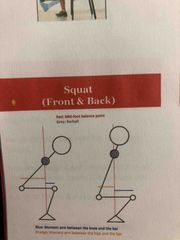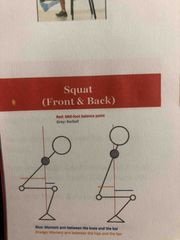![]()
![]()
![]()
Use LEFT and RIGHT arrow keys to navigate between flashcards;
Use UP and DOWN arrow keys to flip the card;
H to show hint;
A reads text to speech;
34 Cards in this Set
- Front
- Back
|
What are the three planes |
Sagittal Transverse Frontal |
|
|
Describe the saggital planes |
The plane divides the body into right and left sides Movements in this plane is flexion and extension move backward forward up and down |
|
|
Describe frontal plane |
Plane divides the body into front and back sides Movements abduction adduction side to side |
|
|
Describe the transverse plane |
Divide the body into top and bottom Movement includes rotation internal and external rotation |
|
|
What are the 8 principle sof biomechanics |
Force motion Force time Inertia (resist changes in state of motion Range of motion Balance/stability Coordination Segmental interaction Sum of all segments |
|
|
What are the three types of lever ARF |
Axis resistance force |
|
|
What are the three types of lever ARF And classes |
Axis resistance force 1st 2nd and third class |
|
|
How do you work out what lever is what |
1st class |
|
|
What are the three types of lever ARF And classes |
Axis resistance force 1st 2nd and third class |
|
|
How do you work out what lever is what |
1st class |
|
|
How do you work out which lever is which |
1st class axis in the middle 2nd class resistance is in the middle 3rd class force is in the middle |
|
|
Describe a open chain exercises (5) |
Distal segment is free to move Usually single joint Can produce shear force at the joint Can be useful when needing to isolate a specific muscle for rehab Used in some level 2 functional exercises eg throwing and kicking |
|
|
Describe a open chain exercises (5) |
Distal segment is free to move Usually single joint Can produce shear force at the joint Can be useful when needing to isolate a specific muscle for rehab Used in some level 2 functional exercises eg throwing and kicking |
|
|
Describe closed chain exercises (4) |
Distal segment is usually in constant contact with the supporting surface Multiple joint movement requiring coordination of muscle activity Usually includes compressive forces that can be helpful Generally functional movements eg squatting |
|
|
Describe a open chain exercises (5) |
Distal segment is free to move Usually single joint Can produce shear force at the joint Can be useful when needing to isolate a specific muscle for rehab Used in some level 2 functional exercises eg throwing and kicking |
|
|
Describe closed chain exercises (4) |
Distal segment is usually in constant contact with the supporting surface Multiple joint movement requiring coordination of muscle activity Usually includes compressive forces that can be helpful Generally functional movements eg squatting |
|
|
Define open kinetic chain |
Allows for greater concentration in isolated joint/muscle movement |
|
|
Describe a open chain exercises (5) |
Distal segment is free to move Usually single joint Can produce shear force at the joint Can be useful when needing to isolate a specific muscle for rehab Used in some level 2 functional exercises eg throwing and kicking |
|
|
Describe closed chain exercises (4) |
Distal segment is usually in constant contact with the supporting surface Multiple joint movement requiring coordination of muscle activity Usually includes compressive forces that can be helpful Generally functional movements eg squatting |
|
|
Define open kinetic chain |
Allows for greater concentration in isolated joint/muscle movement |
|
|
Define closed kinetic chain |
Exercise which the terminal joint meets considerable resistance that prohibits or restrains free rom as the distal joint is stationary |
|
|
Describe a open chain exercises (5) |
Distal segment is free to move Usually single joint Can produce shear force at the joint Can be useful when needing to isolate a specific muscle for rehab Used in some level 2 functional exercises eg throwing and kicking |
|
|
Describe closed chain exercises (4) |
Distal segment is usually in constant contact with the supporting surface Multiple joint movement requiring coordination of muscle activity Usually includes compressive forces that can be helpful Generally functional movements eg squatting |
|
|
Define open kinetic chain |
Allows for greater concentration in isolated joint/muscle movement |
|
|
Define closed kinetic chain |
Exercise which the terminal joint meets considerable resistance that prohibits or restrains free rom as the distal joint is stationary |
|

Which is a front squat and which is a back squat |
Front squat - right Back squat - left |
|
|
Describe a open chain exercises (5) |
Distal segment is free to move Usually single joint Can produce shear force at the joint Can be useful when needing to isolate a specific muscle for rehab Used in some level 2 functional exercises eg throwing and kicking |
|
|
Describe closed chain exercises (4) |
Distal segment is usually in constant contact with the supporting surface Multiple joint movement requiring coordination of muscle activity Usually includes compressive forces that can be helpful Generally functional movements eg squatting |
|
|
Define open kinetic chain |
Allows for greater concentration in isolated joint/muscle movement |
|
|
Define closed kinetic chain |
Exercise which the terminal joint meets considerable resistance that prohibits or restrains free rom as the distal joint is stationary |
|

Which is a front squat and which is a back squat |
Front squat - right Back squat - left |
|
|
What are the key features of a deadlift |
Hip hinge with large hip moment arm Vertical tibias Minimal knee bend Weighted pull from the floor |
|
|
Whats the difference between a good morning and deadlift |
Good morning weight is behind kneck person takes a bow |
|
|
Whats the difference between a good morning and deadlift |
Good morning weight is behind kneck person takes a bow |

